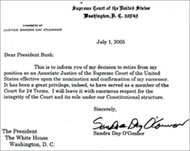US readies for battle over new judge
Sandra Day O’Connor, the first woman appointed to the US Supreme Court and a frequent swing vote, has retired setting up a fierce political showdown for her seat.

O’Connor’s announcement on Friday handed President George Bush his first chance to reshape the ideological balance of the court, which has immense influence over the lives of Americans, interprets the constitution and acts as a court of last resort.
Minutes after O’Connor’s announcement, political leaders and lobby groups fired the first shots in a long brewing battle for the court’s political soul.
Liberals warned Bush not to name an “extremist”, while Republicans urged him to pick someone who would apply rather than interpret the constitution – in other words, a strict conservative.
Pressure begins
“The nation deserves and I will select a Supreme Court justice that Americans can be proud of,” Bush has said.
“The nation also deserves a dignified process of confirmation in the United States Senate, characterised by fair treatment, a fair hearing and a fair vote,” Bush said in a statement delivered in the White House Rose Garden.
|
“President Bush is faced with a decision that affects each and every American” |
Bush said he would pick a new justice in a “timely manner”, but the White House said there would be no announcement before he returned from next week’s G8 summit in Scotland.
Justices are not term limited, so presidents have a chance to mould the country for years after they leave the political scene, through their court picks.
Key cases ahead
Bush’s chance to remake the court is all the more important, because key cases on abortion, assisted suicide and gay rights are looming when justices return from their summer break in October.
Democratic activists fear that Bush will replace O’Connor, who cast the votes in two key abortion rights test cases in 2000, with a ‘pro-life’ justice.
O’Connor, a snowy-haired, 75-year-old judge and former prosecutor told Bush that her retirement would become effective upon the confirmation of a successor.
“It has been a great privilege indeed to have served as a member of the Court for 24 terms,” she wrote in a letter to the president.
Landmark appointee
“I will leave it with enormous respect for the integrity of the Court and its role under our constitutional structure,” wrote O’Connor, who was born in Texas and practised law in the southwestern state of Arizona.
Bush and O’Connor spoke in what aides said was an “emotional” phone call. With a nod to the shared Texas heritage, Bush said: “for an old ranching girl, you turned out pretty good,” according to his spokesman Scott McClellan.
O’Connor was appointed by former president Ronald Reagan and took her seat in September 1981. She often sided with more radical conservatives on the court, as when she voted with the majority to stop recounts in Florida after the 2000 election, effectively handing the White House to Bush over Al Gore.
Cancer-stricken Chief Justice William Rehnquist had been seen as the most likely justice to retire, but has so far made no
announcement on his future.
The bench
 |
|
O’Connor’s retirement opens the |
O’Connor’s retirement opens the first vacancy on the Supreme Court in 11 years. The last justice appointed was the liberal Justice Stephen Breyer, who was named by president Bill Clinton and he took his seat in August 1994.
It leaves Justice Ruth Bader Ginsburg, as the sole woman on the nine-justice Supreme Court bench.
Senator Edward Kennedy, who famously scuppered the confirmation of Ronald Reagan’s Supreme Court nominee Robert Bork, called on Bush to appoint someone who could be embraced by all Americans.
Politics
“Justice O’Connor was a mainstream conservative who was confirmed unanimously by the Senate,” Kennedy said.
“President Bush is faced with a decision that affects each and every American.”
Republican Senate Majority Leader, Bill Frist said: “America needs judges who are fair, independent, unbiased and committed to equal justice under the law.”
The liberal political action committee, MoveOn.org, rolled out a television advertising campaign.
“The message: Don’t nominate an extremist who will undermine the rights of individuals and families as the President did in the Terri Schiavo case several months ago,” MoveOn.org said in a statement, referring to the recent Florida right-to-die controversy.